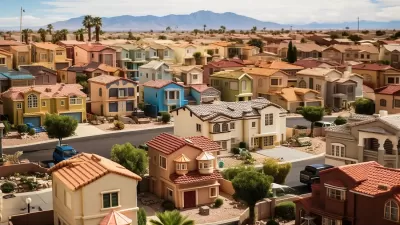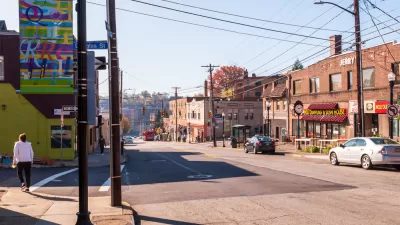When it comes to economics, statistics, demographics, development, and our daily actions, city lines don't count for much - neighborhoods and regions are where things happen, says Kaid Benfield.
We've long focused on cities and towns, strictly defined by municipal boundaries, for everything from statistics about growth and change to decisions about development and services.
Benfield argues that municipal boundaries are irrelevant for everything from people's daily patterns to natural processes, and in some cases our adherence to them leads to misinformation and poor decisions.
We instead ought to pay attention to the regional and neighborhood-scale boundaries that matter: development decisions are most appropriately handled at the neighborhood scale; environmental considerations like runoff and pollution ignore political boundaries and ought to be tackled regionally.
FULL STORY: "Cities" may not matter as much as we think - regions and neighborhoods are where things actually happen

Planetizen Federal Action Tracker
A weekly monitor of how Trump’s orders and actions are impacting planners and planning in America.

Maui's Vacation Rental Debate Turns Ugly
Verbal attacks, misinformation campaigns and fistfights plague a high-stakes debate to convert thousands of vacation rentals into long-term housing.

San Francisco Suspends Traffic Calming Amidst Record Deaths
Citing “a challenging fiscal landscape,” the city will cease the program on the heels of 42 traffic deaths, including 24 pedestrians.

Amtrak Rolls Out New Orleans to Alabama “Mardi Gras” Train
The new service will operate morning and evening departures between Mobile and New Orleans.

The Subversive Car-Free Guide to Trump's Great American Road Trip
Car-free ways to access Chicagoland’s best tourist attractions.

San Antonio and Austin are Fusing Into one Massive Megaregion
The region spanning the two central Texas cities is growing fast, posing challenges for local infrastructure and water supplies.
Urban Design for Planners 1: Software Tools
This six-course series explores essential urban design concepts using open source software and equips planners with the tools they need to participate fully in the urban design process.
Planning for Universal Design
Learn the tools for implementing Universal Design in planning regulations.
Heyer Gruel & Associates PA
JM Goldson LLC
Custer County Colorado
City of Camden Redevelopment Agency
City of Astoria
Transportation Research & Education Center (TREC) at Portland State University
Jefferson Parish Government
Camden Redevelopment Agency
City of Claremont




























